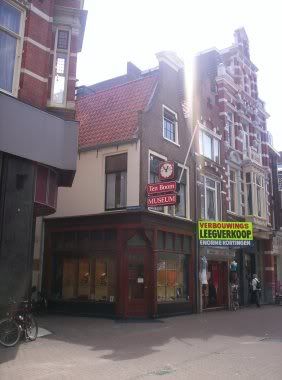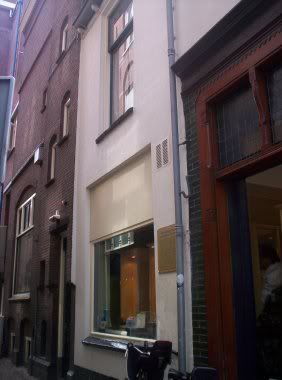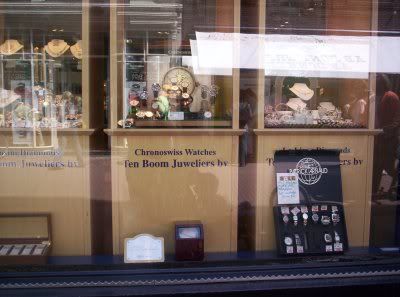Yesterday we made another train trip to the sleepy little town of Haarlem, the Netherlands. We enjoyed our visit the last time we were there, and decided to go back to take another look at the Grote Kerk (the "Great Church"). I had just finished a book called "The Hiding Place" by Corrie Ten Boom, so I was excited to see the house where the events in the book took place.
Corrie (Cornelia) ten Boom lived with her father and sister in this little house near the main square in Haarlem. Their father owned a small watch repair shop located on the first floor of their home. Mr ten Boom thoroughly enjoyed his work, so much so that he regularly forgot to send his cutomers their bills! When Corrie was in her early 20's she took over the business end of her father's work and was able to make the business a profitable venture for the family.
The ten Boom family were devout Christians. They regularly took orpans into their home, gave hot meals to beggars, and housed pregnant young women who had no where to go. When World War II broke out, Corrie and her spinster sister Betsy were in their mid-50s. The family was horrified by what was happening to their fellow Dutchmen - the Jews.
Corrie's brother Willem owned a nursing home in the rural area of Silversum, the Netherlands. When the Dutch Jews were being deported for work camps, he began housing Jews in the nursing home, saving them from the yet unknown.
One day there was a knock at the side door of Corrie's house. It was a young pregnant Jewish woman. Her husband had been taken to a work camp and she had no where to go. The towns-people had told her to get help at the ten Boom house - they always helped people in need!
After this, the side doorbell rang more often. Corrie and her family began helping Jews who were threatened with deployment to the work camps. Because the ten Boom house was close to the center of town, it was not a good hiding place for those trying to flee the Nazi reign, but it did serve well as a transitional home for those awaiting a permanent safe hiding place. Soon Corrie became a sort of "ringleader" for the Dutch efforts to protect the Jews. Not only did she open her home to those in need, but she coordinated theft and falsification of ration book coupons.
One passage of Corrie's book tells of her surprise when visiting her brother Willem's nursing home. She couldn't understand why he had so many young nurses working there. Surely he couldn't afford hiring all of these young women! But then she suddenly understood....these "young women" were actually young Dutch men! The Germans had begun recruiting young Dutch boys to serve the German army. It was now time for the Dutch to protect their own young men!
Corrie also tells the story of "The Bulldog". Corrie and her father took reglular morning strolls. Each morning as they walked, they passed a man who was walking with his two bulldogs. She thought it uncanny that the man himself had the face of a bulldog! It was interesting that he chose bulldogs as his pets! One morning as she and her father were taking their walk, they passed "The Bulldog", but he was walking alone, with his eyes toward the ground. Where were his beloved pets? Corrie and her father followed the man to his home, where he ran a bookstore. They asked the man if his pets were ill. He told them that he was a Jew. He knew that the Germans would be coming for him soon. What would happen to his dogs? He didn't want to abandon them. He didn't want them to be starved or worse.....so he used all of his ration coupons to buy meat. And he give his bulldogs the best meal of their lives...along with a dose of poison for each. He sat and held his dogs as they fell asleep, then buried them and said goodbye. One week later the ten Booms walked past the man's book store and found it boarded up. "The Bulldog" was never to be seen again.
Corrie also had a sister named Nollie, who was married and had children. They lived in hte outskirts of Haarlem. Nollie's son was a piano prodigy. He learned to play piano at a young age and played well. When the family got their first radio they witnessed a miracle. The young boy listened to a song on the radio and then went to the piano and played the exact same song, after never having heard it before! When Corrie's nephew was 14 years old, he entered an organ competition. The event would take place at the Grote Kerk - a beautiful old church in the center of Haarlem. When the day of the competition came, the whole family gathered at the church, prepared to hear their nephew play the massive old pipe organ, and ready to celebrate afterwards. Imagine their shock, when it was the nephew's turn to play, and instead of playing the piece he had practiced for weeks, he broke the German law and played the Dutch national anthem! This was strictly forbidden, but was a welcome relief for the Dutch congregation, who began weeping and singing with all their strength. The family was terribly worried that the authorities would find out, but breathed a sigh of relief when there were no repurcussions. Two weeks later, the 14 year old nephew was taken off to jail. He served in the federal jail in Amsterdam for 8 months before there was talk of taking him off to a work camp to free jail space. At this point Corrie was able to convince the Haarlem authorities to take him back to the Haarlem jail, which was not overcrowded. The Dutch police captain in Haarlem was able to authorize the transfer and "lose" important papers, so long as he would never see the nephew again. The ten Booms used the watch and clock display in the store window to communicate with Jews and other Dutch sympathizers. A small triangular shaped sign that said "We now sell Appel watches" was displayed in the window when the "coast was clear". The understanding was that if the sign was not there, then it was not safe to come to the house. Corrie would remove the sign if things went bad....or so she thought. One day a man came into the shop and told her that he needed help. He explained his dreadful situation and Corrie promised to help. He was to come back to the store later....and he did, along with the German police force. It was a trap and Corrie fell for it. She should have realized that he didn't come to the side door. She should have noticed that his eyes would not meet hers.
The ten Booms used the watch and clock display in the store window to communicate with Jews and other Dutch sympathizers. A small triangular shaped sign that said "We now sell Appel watches" was displayed in the window when the "coast was clear". The understanding was that if the sign was not there, then it was not safe to come to the house. Corrie would remove the sign if things went bad....or so she thought. One day a man came into the shop and told her that he needed help. He explained his dreadful situation and Corrie promised to help. He was to come back to the store later....and he did, along with the German police force. It was a trap and Corrie fell for it. She should have realized that he didn't come to the side door. She should have noticed that his eyes would not meet hers.
When the German police came to arrest the ten Booms, the family was in the middle of their weekly prayer meeting. Corrie, her sister Betsy, her father, sister Nolly, Nolly's husband and son, her brother Willem, and Willem's wife and son were all arrested. But instead of carting them off to jail, the German police held them prisioners in their own home...and waited. They waited for more and more people to show up at the side door. In all, 35 people came to the door that night - some of them Jews looking for help, some of them part of the Dutch underground, some just delivering messages about the underground operation. All 35 of those people were taken to jail and later concentration camps.
Corrie and her sister Betsy were taken to prison and later to a concentration camp. While in the camp they held nightly bible reading sessions and helped the people there cope with the horror that they were living.
Mr ten Boom died soon after being released from prison. Betsy died while in the concentration camp. Corrie survived and went on to travel to 64 different countries, giving lecures about her experiences during the war and in the concentration camps.
Wednesday, July 20, 2005
Corrie Ten Boom
Subscribe to:
Post Comments (Atom)




2 comments:
We're going to Amsterdam next spring. I never knew of this book, but now I am anxious to get it and have my family read it before we go. Thanks for the details from it!
Wow, what great information, Jen! I have always been interested in Corrie ten Boom from a religious standpoint, but I didn't know about all the things you wrote about. Very interesting. Thanks for posting this.
Post a Comment